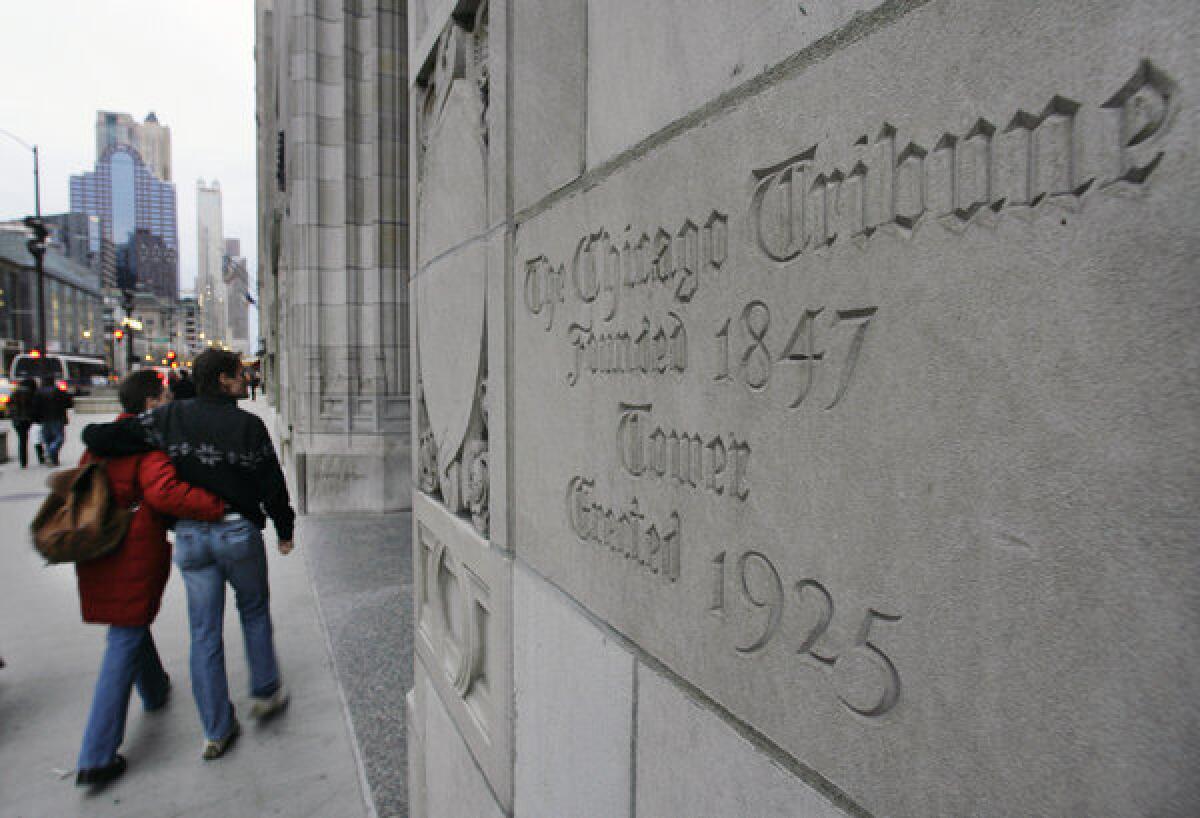Tribune’s $2.7-billion TV deal would accelerate media consolidation

Tribune Co.’s proposed $2.7-billion acquisition of 19 television stations owned by Local TV Holdings would accelerate the rapid consolidation of the television business.
Tribune on Monday said that it had entered into a definitive agreement to buy the stations, which would give Tribune a total of 42 TV stations -- up from its current count of 23. The all-cash deal would make Tribune one of the biggest TV-station owners in the country and the largest independent affiliate station group for Fox Broadcasting. Tribune would control 14 Fox affiliates.
The agreement is the largest broadcasting deal in the U.S. in several years. It comes less than a month after Gannett Co. announced an accord to acquire 20 big-market TV stations owned by Belo Corp. in a deal valued at $2.2 billion.
Another large independent station owner, Sinclair, also has been snapping up smaller stations in the past two years to extend its reach.
STORY: Tribune buys 19 television stations in a $2.7-billion deal
“Scale matters,” Tribune Chief Executive Peter Liguori said Monday in a conference call with Wall Street analysts. He said that Tribune would look at other TV station purchases or perhaps swapping stations with other ownership groups.
“But right now, job No. 1 is to operate what we have at the highest levels and greatest efficiencies,” Liguori said. “We believe this transaction is a perfect complement to our existing businesses.”
Tribune is the parent company of the Los Angeles Times, the Chicago Tribune, KTLA-TV Channel 5 in Los Angeles and other media properties.
Media watchdogs immediately expressed concern about the possibility of increased consolidation in television, an important source of news for many Americans.
“Wall Street may be overjoyed at this merger mania, but the rest of us should be very worried about having fewer viewpoints on the air and fewer reporters on the beat,” Craig Aaron, chief executive of the Free Press watchdog group, said in a statement issued Monday.
PHOTOS: Hollywood Backlot moments
“By the time all these deals are done, a handful of companies could control almost all of the network affiliates in major markets and swing states,” Aaron said. “This deal adds to a blizzard of broadcast industry consolidation that is poised to leave America’s media system less local, less diverse and less accountable to the people in these communities.”
After falling out of favor with investors five years ago amid a brutal advertising recession, TV stations once again are viewed as valuable properties. The TV-station business has strongly rebounded in the last three years, largely because of the return to health of the auto industry and several political campaign cycles that saw big spending on local TV ads.
The 19 stations that Tribune is to acquire -- including outlets in Denver, Kansas City, St. Louis and Cleveland -- would mean Tribune TV stations would be available in more than 50 million homes in the country. Tribune already has a presence in the largest markets: Los Angeles, New York and Chicago.
Even with the new stations, Tribune would not come close to reaching the cap established by the Federal Communications Commission that prevents groups from owning stations available in more than 39% of the country.
The deal, however, is expected to run afoul of FCC cross-ownership rules because Tribune would own TV stations and a newspaper in Norfolk, Va.
The deal would make Tribune less reliant on the fading fortunes of its newspapers, which also include the Baltimore Sun and the Sun-Sentinel of South Florida. Tribune has hired investment firms to look at strategic options for the newspapers, including a possible sale.
The transaction with Local TV -- the first major deal for Tribune since it emerged from bankruptcy protection Dec. 31. -- is expected to close this year, subject to regulatory approval.
Tribune said it was motivated, in large part, by the revenue-generating capacity of the stations to be acquired, many of which are market leaders in local news. Several of the stations are in important political battleground states, including Ohio, Colorado and Virginia.
Tribune also hopes the added heft would help it negotiate higher fees from pay-TV operators to carry its local stations and the superstation WGN America.
Building the WGN America cable channel, which is available in about 75 million homes, into a more robust offering is one of Tribune’s top priorities. The company intends to create more original programming, including developing syndicated daytime shows for its TV stations that it could sell to other station groups.
With the new stations, Tribune’s revenue this year would more than $3.5 billion on a pro forma basis, the company said.
Tribune has about $550 million in cash on hand, some of which it would use to buy the Local TV stations. The company also would use money from a $4.1-billion credit facility with JPMorgan Chase, Bank of America Merrill Lynch, Citigroup, Deutsche Bank and Credit Suisse. Tribune also indicated that it would restructure some of its existing debt.
ALSO:
Tribune buys 19 television stations in a $2.7-billion deal
ABC rolling out Watch ABC app to Los Angeles and other markets
News Corp. divides into two companies; 21st Century Fox is born
MORE
PHOTOS: Highest-paid media executives of 2012
ON LOCATION: People and places behind what’s onscreen
PHOTOS: Hollywood back lot moments
More to Read
From the Oscars to the Emmys.
Get the Envelope newsletter for exclusive awards season coverage, behind-the-scenes stories from the Envelope podcast and columnist Glenn Whipp’s must-read analysis.
You may occasionally receive promotional content from the Los Angeles Times.









